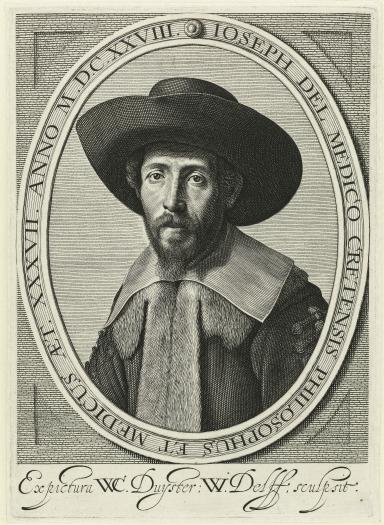Elim: Ma‛ayan ganim (Elim: A Garden Spring)
Willem Jacobsz
Joseph Solomon Delmedigo
1629
And moreover, that which is called “external wisdom” is indeed the daughter of my father [see Genesis 12:20], a good doctrine (Proverbs 4:2) and a gift of God [see Ecclesiastes 3:13], who graces us with intelligence, which is our essence. With this wisdom is a fountain of life, through whose light we will see light [see Psalms 36:10], after Lot was separated from him (Genesis 13:14–15). It removes the filthy garments from upon us [see Zechariah 3:4] and clothes us in scarlet, with other delights [see 2 Samuel 1:24].
This external wisdom includes the study of logic and similar fields, such as grammar, poetry, and song, which are required for the preparation of the twenty-four holy books of the Bible, whose poetry is narrow, while no bird of prey knows the path of the songs in the Bible [see Job 28:7]. Such studies would help us respond to those who attack us with fraudulent abstract analyses, which are constructed on the basis of the verses. Who is so thoughtless as to turn here [see Proverbs 9:16] to fight them without a double-edged sword? For they know the ways of the desert, and they have all the wordsmiths and craftsmen. Indeed, they curl out their lips [see Psalms 22:8] against the spurned lambs.
It also includes the field of mathematics, which is enthroned on high (Psalms 113:5). For nobody knows the true nature and essence of the spheres to this day, and anyone whose heart stirs him [see Exodus 35:21] will construct edifices and fashion ladders in his own manner, using wondrous and powerful stratagems, so that he might perhaps discover their features and the causes of their movement. For they declare the glory of God (Psalms 19:2) and reveal the work of the Lord, which is tremendous [see Exodus 34:10] in the existence of the separate intellects. This field of knowledge also looks down low (Psalms 113:6) to observe the wisdom of measurement—how great are the works of geometry, as they reveal the expanse of the wide land, to its length and breadth. It also rises upward to ascertain the height of the skies and the place of the stars, and descends to the depths of the sea, where it finds out its ways in the fierce waters. Its steps hold fast to its paths [see Psalms 17:5], and it will not be withheld from drawing out the earth from its place. Its eye sees every precious thing [see Job 28:10], as it has given birth to numerous sons: stereometry, mechanics, optics, perspectives, and the like. For the spirit of the Lord is within it, while upon it is a strong staff, a beautiful rod (Jeremiah 48:17): the wisdom of the spheres, which opens the eyes of the blind, and which could cover all the expenses of kings and countries and their wanderings if the entire settled world was filled with it, and through which we would know the number of the drops of the sea and the sand on its shore and the stars of heaven and their paths.
Furthermore, its stature is exalted [see Ezekiel 19:11] over all the corselets and the amulets [see Isaiah 3:20], through that precious vessel and royal treasure—the wisdom of algebra, the well that was dug by [see Numbers 21:18] cunning charmers [see Isaiah 3:3]. How many levels of goodness has the Omnipresent bestowed upon us, and yet this portion is equal to all that He has granted to us in His righteousness. It is for us like eyes [see Numbers 10:31], as it brings out all mysteries to the light with its flame. This is lofty, exalted wisdom, without which I would be like a deaf person, unable to hear, and there my soul would dwell in silence [see Psalms 94:17].
Also included is the wisdom of music, the understanding of the various sounds and their duration, as well as harmonic relationships; to know how to sustain one who is weary with words [see Isaiah 50:4] and sounds in faraway isles. For we can express what is in our hearts through the language of gentiles, and this music resides in the king’s palace, for when they are terrified by an evil spirit from the Lord [see 1 Samuel 16:14], they can forget their bitterness by means of music and song.
However, another purpose is served by mathematics, in addition to the aforementioned benefits and advantages: it accustoms our minds to abstracting the ideas of things from their material substances. This method leads to the sciences of metaphysics, as stated by the sage Ptolemy, in the introduction to the Almagest.
Next is physics [the study of nature], the mother of all life (Genesis 3:20). She teaches the origins, causes, forms, characteristics, and qualities of the beings fashioned from the four elements, and this includes healing bodies. She spreads her wings up to the firmament of the heavens and encompasses all that is seen in the air above the ground. She makes her bed in the netherworld [see Psalms 139:8] in order to discern the quarried substances and to unearth the source of springs. She wanders around the world to investigate the qualities of plants, fish, fowl, crawling creatures, and beasts, as well as the structure of their parts and the purposes of their limbs. And He has put in her heart that she may teach [see Exodus 35:34] how to increase the number of species by grafting different types of trees and herbs, and crossbreeding animals. She is also able to strip the components of inanimate objects from their present shape in order to give them life; from the carcass of a lion and the dead body of a horse she can give birth to bees. She brings together the flowing liquid of metals and separates their compound parts, and instead of brass she brings gold [see Isaiah 60:17]. One who blows the fire of coals [see Isaiah 54:16] will be glad and rejoice when this scroll of mysteries is revealed to him. Her countless topics and inquiries include knowledge of the rational soul, its powers and actions—all its knops and flowers. If the reflection upon each and every being leads a person to recognize the lofty Creator, and to extoll the Master of all goodness and causes, all the more so in our own flesh we can perceive the Lord who made us, and we should praise Him, for all His judgments are like the great deep [see Psalms 36:7].
As for the study of ethics, which pertain to one’s personal conduct and that of one’s household and country, I swear that this is the upright path that one who wishes to perfect his soul should choose [see m. Avot 2:1]. And I will take for me faithful witnesses (Isaiah 8:2) to record this, as the sages of the Talmud relate that Greek scholars would come from Athens to Jerusalem to listen and study [see, e.g., b. Bekhorot 8b]. This occurred in former times in Israel [see Ruth 4:7]: all types of wisdom and insight were given at Sinai, as a portion to Moses, and in the days of the prophets it was in the possession of trustworthy people, while women came and set alight [me’irot; see Isaiah 27:11] the paths of the heavenly bodies [me’orot], and there were also many orators, poets, doctors, and philosophers of nature among the Hebrews. In addition, the divine wisdom of theoretical kabbalah was like a living bird [see Leviticus 14:6] which found a home [see Psalms 84:4] and was handed down to the prominent individuals of Jerusalem. The study of mathematics likewise made a nest there [see Psalms 84:4], while music laid her chicks [see Psalms 84:4] between the altars of the Lord of Hosts; they flourished in the courtyards of our God [see Psalms 92:14] in the days of King Solomon.
Nowadays, however, due to our sins and the sins of our fathers, in this lengthy, mean, and pitiable exile, our stars have darkened, our spirits have weakened, and our wisdom has soured. We see no favorable signs, and no one among us knows how to make cakes in the labor of heaven [see Jeremiah 7:18] or to inform our children [see Isaiah 38:19] of its substance. The springs of discernment have become stopped up [see Genesis 8:2] and those who look out are darkened in the windows of heaven [see Ecclesiastes 12:3]; they are accounted as strange women [see Genesis 31:15], those who are wise in their own eyes. The moon is confounded and the sun ashamed [see Isaiah 24:23]; they walk in darkness and have no light [see Isaiah 50:10]. Meanwhile, the studies over which they turn ourselves over are like children of their own age; today they whisper about them, but like sons of the stranger they dwindle away before them [see 2 Samuel 22:45]. The sun is a source of travail for them, and the moon vanity. Behind the doors and the posts they have set up its symbol [see Isaiah 57:8], under oaks and poplars (Hosea 4:13); who has counted the stars of heaven and their constellations [see Isaiah 13:10] in this generation?
There are, however, a few exceptions: One is a scholar from the city of Venice, a minister, great among the Jews (Esther 10:3), his name is known in the gates of power [see Proverbs 31:23], he is the community rabbi, his honor our teacher, R. Simḥah Luzzatto, may his Rock protect and sustain him. He is knowledgeable in all aspects of mathematics; he enters its chamber and his mouth is sweetened with the honeycomb of its forests. It found favor in his eyes and has rested between his breasts [see Song of Songs 1:13]. He composed a work, either on geometry or astronomy, I do not know which. Second is an honorable and wise man of my acquaintance from the city of Cairo, Egypt, a man raised up [see 2 Samuel 23:1], the minister and champion, his honor R. Jacob Alexandri, a man in whom there is spirit (Numbers 27:18) and who provided his own contribution to these studies, in the form of forty lessons on the first six books of Euclid, hammered into place like nails, through well-grounded proofs.
Your honor is the third in the group. Your wisdom is wondrous in my eyes, as is the glory of your excellent silver and your heralds—I did not believe the rumors from a distant land until I saw your words. For you have come to search out my thin land [see Joshua 2:3]; to prove me with hard questions [see 1 Kings 10:1]. You have no need of me, since it is evident from the walls of your house and the content of your communiqué that you have ten times more wisdom than I.
Other works by Delmedigo: Matsref le-ḥokhmah (1629); Letter to Zerah of Troki (1840).
Credits
Joseph Solomon Delmedigo, Elim: Ma'ayan ganim (Elim: A Garden Spring) Amsterdam: be-vet Menasheh ben Yisra’el, 1629. Republished as: Joseph Solomon Delmedigo, Sefer Maʻyan ganim (Odesa: M. Grinshpan ve-shutafo M. A. Belinson, 1865), 129–131.
Published in: The Posen Library of Jewish Culture and Civilization, vol. 5.





